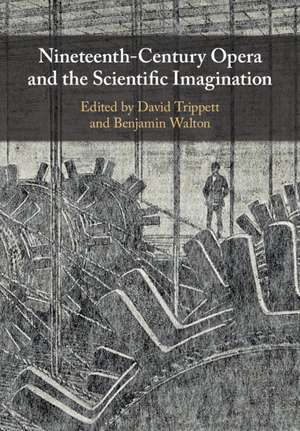Nineteenth-Century Opera and the Scientific Imagination
Editat de David Trippett, Benjamin Waltonen Limba Engleză Paperback – 21 iul 2021
| Toate formatele și edițiile | Preț | Express |
|---|---|---|
| Paperback (1) | 326.70 lei 43-57 zile | |
| Cambridge University Press – 21 iul 2021 | 326.70 lei 43-57 zile | |
| Hardback (1) | 776.58 lei 22-36 zile | |
| Cambridge University Press – 21 aug 2019 | 776.58 lei 22-36 zile |
Preț: 326.70 lei
Nou
Puncte Express: 490
Preț estimativ în valută:
62.52€ • 65.03$ • 51.62£
62.52€ • 65.03$ • 51.62£
Carte tipărită la comandă
Livrare economică 14-28 aprilie
Preluare comenzi: 021 569.72.76
Specificații
ISBN-13: 9781107529021
ISBN-10: 1107529026
Pagini: 397
Ilustrații: 25 b/w illus. 2 tables 15 music examples
Dimensiuni: 166 x 244 x 23 mm
Greutate: 0.63 kg
Editura: Cambridge University Press
Colecția Cambridge University Press
Locul publicării:New York, United States
ISBN-10: 1107529026
Pagini: 397
Ilustrații: 25 b/w illus. 2 tables 15 music examples
Dimensiuni: 166 x 244 x 23 mm
Greutate: 0.63 kg
Editura: Cambridge University Press
Colecția Cambridge University Press
Locul publicării:New York, United States
Cuprins
1. Introduction: the laboratory and the stage David Trippett and Benjamin Walton; Part I. Voices: 2. Pneumotypes: Jean de Reszke's high pianissimos and the occult sciences of breathing James Q. Davies; 3. Vocal culture in the age of laryngoscopy Benjamin Steege; 4. Operatic fantasies in early nineteenth-century psychiatry Carmel Raz; 5. Opera and hypnosis: Victor Maurel's experiments in suggestion with Verdi's Otello Céline Frigau Manning; Part II. Ears: 6. Hearing space in the music of Hector Berlioz Julia Kursell; 7. From distant sounds to Aeolian ears: Ernst Kapp's auditory prosthesis David Trippett; 8. Wagner, hearing loss, and the urban soundscape of late nineteenth-century Germany James Deaville; Part III. Technologies: 9. Science, technology and love in late eighteenth-century opera Deirdre Loughridge; 10. Technological phantoms of the opéra Benjamin Walton; 11. Circuit listening Ellen Lockhart; Part IV. Bodies: 12. Excelsior as mass ornament: the reproduction of gesture Gavin Williams; 13. Automata, physiology and opera Myles Jackson; 14. Wagnerian manipulation: Bayreuth and the sciences of the mind James Kennaway; 15. Unsound seeds Alexander Rehding.
Recenzii
'There is an interesting discussion of whether opera was beneficial or dangerous for the mentally ill. This exploration of the intersection of two important aspects of 19th-century Western life will interest scientists and musicians alike.' R. Pitts, Choice
Descriere
Explores the rich and varied interactions between nineteenth-century science and the world of opera for the first time.
